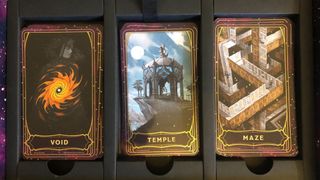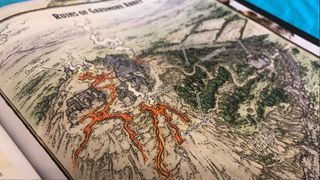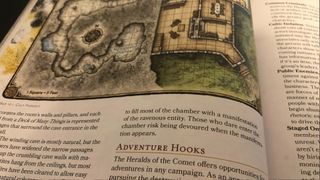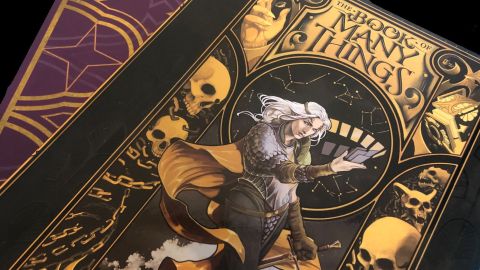GamesRadar+ Verdict
The Deck of Many Things is a big, bulky puzzle piece that struggles to fit anywhere, despite the glittering potential behind much of what's being offered. Too big to add to most campaigns, too thin to be a campaign itself, the ideas present are nonetheless great, but require a very flexible Dungeon Master to fold them into any running game without compromising what came before.
Pros
- +
Great new player options for characters
- +
The mini-adventures are well-made, if a bit isolated
- +
Procedurally-generated encounters are fun
Cons
- -
Very hard to fold into existing campaigns without pure chaos
- -
The actual deck lacks visual personality
- -
Price feels pretty excessive
Why you can trust GamesRadar+
The Deck of Many Things has historically been one of those infamous Dungeons & Dragons elements that's a bit like the Tarrasque – something that the party is constantly threatened with, but ultimately comes down to just bluff and bluster, because what Dungeon Master needs that headache? Specifically, the Deck is a long-running mythical artifact in D&D lore that's effectively the ultimate random event generator: pull a card from its rifled depths, and you might be showered in riches, given free use of the Wish spell, get locked outside of the universe, or just have your soul ejected from your body.
Consequently, The Deck is recognised in DM circles as something of a campaign-ruiner, an enormous wrench to throw into any carefully-crafted story, because there's no real planning for what it might do. But now Wizards of the Coast seek to correct that with a weighty new supplement pack themed around The Deck of Many Things in order to make it feel a bit more chaotic good than chaotic evil.
Features & design
| Price | $99.99 / £79.99 |
| System | D&D Fifth Edition (5e) |
| Players | 2 - 6 |
| Lasts | 3 - 4hrs per session |
| Play if you like | Curse of Strahd's Tarroka deck, Roguelikes and prog-gen gameplay |
- 66-card set in dedicated case
- New rules for generating encounters
- Various card-themed ideas and options
The bundled Deck of Many Things pack is, in fact, two books and a set of cards in a dedicated storage case, all of which are intended to be a D&D Fifth Edition supplement that a DM can fold into existing campaigns from Dungeons and Dragons books – though the ease with which that might be done is something I'll discuss momentarily.
First of all, let's address the titular physical deck itself, an expanded version of the classic deck made of 66 individual cards – triple that of the original 22-card concept. It's a well-drawn (if flimsy-feeling) deck with the usual well-made artwork, though I feel that some more creative license might've been taken artistically. The Map card, for example, just shows… a map. A very well-drawn map, I'd be the first to admit, but not an especially interesting take on the idea – all Intelligence and no Charisma, so to speak.

It's hard to explain, but think of it like this: the Tarroka deck that came with Curse of Strahd had an aesthetic, a creepy, appropriately gothic vibe, and there's no shortage of tarot decks online that almost seem to thrum with magical energy, their artwork and design extremely evocative of some place or power. This Deck of Many Things looks nice, I guess, but it doesn't have an especially strong feeling to it – certainly not one that speaks to a legendarily fickle and dangerous creation of the gods. Instead, it just looks like what it is: a licensed toy.
The Deck itself comes presented in a special case, within which you can also find the Card Reference Guide, a hardcover book detailing what can be read from each card – how to use them as part of random events and the like, with a little system loaded up front on how the Deck can be used to cause/predict events within your game. For example, it tells you that if you draw the Crossroads card reversed, you'll get some monster that traps people, or a magic item with limited uses.
I do like The Deck of Many Things, but even now I'm not entirely sure who it's for
If you want to use the deck as an adventure-generator, rather than using it as the most extreme version of a Wild Magic Surge table, the CRG is basically what you need to do that. It's probably a bigger book that it needs to be, about 80% pretty pictures, but it's a nice-looking addition and to some extent feels like the most important part of the set.
Finally there's The Book of Many Things, a classic D&D 5e tome that details various uses for the cards – using them to generate adventures, as well as some new card-themed items, spells, backgrounds, locations, monsters, and NPCs that DMs can bring in as part of the Deck's effects, or if building narratives around it. There's good stuff among this (I like some of the new player options particularly), but keep in mind that despite having all this within it, I did not describe this book as a campaign – and that's
Gameplay

- Seems difficult to integrate into existing games
- New monsters and locations are intriguing
- Players will love the new options available
I do like The Deck of Many Things, but even now I'm not entirely sure who it's for and how it would be used. The first page of the book admits that the original Deck had its game-ruining qualities and that this supplement is the solution, a way of making it more natural, but as somebody who's constantly running D&D games, I can't really work out where this would all fit into an existing campaign. It's far too threadbare to be a full adventure, but it's still bulky and chaotic enough that I can't really imagine it being added to an existing game without completely derailing it, like carefully planning a holiday itinerary before somebody suddenly mentions that you'll need to make allowances for their pet falcon.
As a Dungeon Master, I guess your best hope is probably to write a campaign from scratch into which the disparate elements from TDoMT can be folded more organically. Alternatively, I guess you could use it as a system to generate fun moments during long-distance travel or downtime, drawing some cards to determine the day's events, both good and bad. The latter is a solid idea, but one that does leave most of the supplement dusty and untouched.
The ideas here are a bunch of loose and flailing threads, but woven right, they'd probably make one hell of a tapestry
But all the ideas presented here are cute, if you can work out how to fit them together. I like the two new player backgrounds that speak to fickle fate, 'Ruined' and 'Rewarded.' There's imagination-provoking new locations too, and fun, Gambit-reminiscent spells and feats about slinging playing cards at opponents, perfect for the player who chooses to be a Huckster in games of Weird West. The ideas here are a bunch of loose and flailing threads, but woven right, they'd probably make one hell of a tapestry.
Should you buy The Deck of Many Things?

My uncertainty about recommending The Deck of Many Things gets more uncertain when I see the hefty price tag attached to the bundle. All the material here is theoretically strong, but I'm not sure how easily it could be implemented into gameplay – or if it's worth twice the price of many other D&D expansions. Those currently writing their own campaigns from scratch will definitely be able to fold in a lot of the ideas here, smoothing out the edges and filling it out into a full game, and I suspect that The Deck of Many Things will shine in that context - but otherwise, it risks feeling a bit too fickle, chaotic, or generally derailing for those games already in progress. And I suppose when looked at like that, the designers have captured the spirit of the original cards pretty accurately.
Buy it if...
✅ You're a DM who loves to roll with the punches
If you like the idea of randomly-generated adventures, or want to fill downtime and long-distance travel with potential and chaotic energy, this is the expansion for you.
✅ You're adept at improvisation
For anyone with a wealth of maps and tokens ready to go on the fly, or a knack for making stuff up as you go, you'll get along well with The Deck of Many Things.
Don't buy it if...
❌ You've got a carefully constructed campaign
For anyone that likes to plan their sessions meticulously, or who is running a pre-written adventure, approach with caution - your story might collapse under too much pressure with the addition of this pack.
❌ You're hoping for a full adventure
If you want a proper campaign or a coherent journey you can run as-is, you'll likely be disappointed.
How we tested The Deck of Many Things
This product was read through and reviewed by a DM with over ten years of experience, who ran a session for friends based on the procedural generation mechanics in the Card Reference Guide, and involved some of the new Monsters and Locations.
Disclaimer
This review product was provided by the publisher.
More info
| Genre | RPG |

Joel Franey is a writer, journalist, podcaster and raconteur with a Masters from Sussex University, none of which has actually equipped him for anything in real life. As a result he chooses to spend most of his time playing video games, reading old books and ingesting chemically-risky levels of caffeine. He is a firm believer that the vast majority of games would be improved by adding a grappling hook, and if they already have one, they should probably add another just to be safe. You can find old work of his at USgamer, Gfinity, Eurogamer and more besides.

Helldivers 2 dev asks players to stop deliberately shooting at soldiers with that sweet blue pre-order bonus armor that's apparently a yogurt salesman uniform

Stellar Blade release time – the countdown to the new PS5 action RPG is on

Wilson Fisk celebrates 60 years of Daredevil by reclaiming his mantle as the Kingpin
